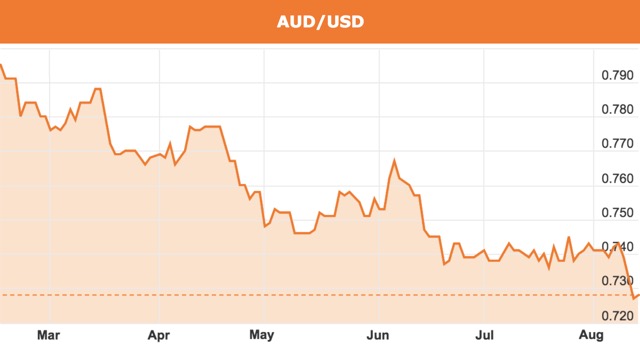Why Turkey’s financial crisis is so bad for Australia

Sometimes Australians are remarkably blasé about offshore financial crises but there are many reasons we should be very worried about the crisis in Turkey which is now roiling world markets.
Our dollar is caught in the downdraft
The first reason is already upon us as the Australian dollar continues to dive against the US dollar.
The weaker Australian dollar is showing us that we are on the wrong side of one of the greatest tidal changes of money we have ever seen.
The cash that was furiously printed after the GFC by the US, Europe, Japan and many others pushed out to the furthest reaches of the world, including Australia, offering ultra-low interest rates on loans.
Turkey was one of the overjoyed recipients, slurping down so much foreign currency debt that the grand total owed by Turkish companies, banks and the state is now estimated to be 55 per cent of Turkish GDP.
Even worse, Turkey is now totally reliant on further short term foreign currency loans to cover a current account deficit that is running at 6.5 per cent of GDP.
Without that money things are going to change in Turkey and change very quickly as it is no longer able to afford to import fuel and goods that it needs to keep its economy going.
That is going to be incredibly difficult because the flood of money printed during the quantitative easing days is now flowing back to where it came from and particularly to the US as its interest rates continue to rise and central banks begin to shrink their bloated balance sheets.
High household debt, property slump and stagnant wages
The second reason that the Turkey crisis is going to hurt Australia is that in broad terms we are on the Turkish side of this equation.
Granted, Australia is infinitely better run that the disastrous Turkish economy and we are not nearly as indebted and don’t enjoy playing Russian roulette with our economy like Turkish strongman and president Recep Tayyip Erdogan.
It is highly unlikely that we will see an Australian leader defy our Reserve Bank and refuse to raise interest rates and it is also unlikely that our banks will be struggling to remain solvent like Turkey’s banks.
However, we are have our own issues such as high household debt, a faltering property market and stagnant wages.
While our official interest rates remain at 1.5 per cent, the same funding pressures that are hurting Turkey apply to us, with costlier foreign lending by banks to finance property lending in the process of ratcheting through to borrowers.
It is not impossible to construct a scenario in which interest rates on our large personal borrowings begin to ratchet upwards, either through higher foreign funding pressures on the Australian banks or, eventually, the Reserve Bank being forced into raising rates to protect the Australian dollar against further falls.
We are not there yet but as a borrowing nation at a government and personal level, we are in the crosshairs of any global rise in interest rates from the ultra-low levels they reached during the post-GFC period of easy money.
Trade being caught up in disputes
The final area in which Australia is threatened by the Turkish crisis is in trade.
It is no coincidence that the Turkish crisis is tied up with President Trump’s move to apply tariffs to a variety of items.
Indeed, President Trump has already used one of his trademark policy tweets to say that he is doubling the tariffs on Turkish steel and aluminum “as their currency, the Turkish Lira, slides rapidly downward against our very strong dollar!”
“Aluminum will now be 20 per cent and steel 50 per cent. Our relations with Turkey are not good at this time!’’ said Mr Trump, with typical understatement.
Australia is a great beneficiary of free trade and, conversely, is hit when trade is restricted which is happening at the moment.
While there is not too much risk of direct financial contagion between Turkey and Australia, there are many other countries with large foreign debts that could be caught as the tide of money flows back towards the US.
Other countries could be in firing line
Countries like South Africa, Indonesia and Colombia could be caught up in similar debt spirals in which a weak currency continues to blow out foreign debts until they become difficult to service.
The classic way to trade out of this sort of situation is to continue to depreciate your currency, raise domestic interest rates and try to export like crazy to get back on top of the situation.
Turkey may be resisting this solution due to the absolute economic ignorance and incompetence of its leadership but you can bet other countries won’t be the same.
That will be particularly harmful for countries like Australia which is a big exporter of minerals and energy.
We function best during booming world growth and free trade but will certainly be caught in the crossfire of increasing trade wars and export competition.

